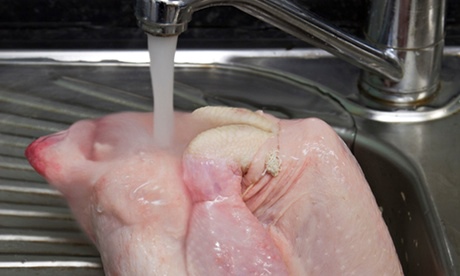
The Food Standards Agency's warning to consumers not to wash chicken before cooking may raise concerns about the presence of campylobacter in raw poultry, but it's also a rare triumph for all those people who never washed a chicken because they couldn't be arsed. It's not often, after all, that lazy people come top in the hygiene stakes. What other food safety tips can the slovenly teach the fastidious?
Decontamination
Your dishwasher will sterilise most things. In fact, if you really have a urge to wash a chicken breast before cooking, you can skip a step by cooking it in the dishwasher. Just wrap it in foil first and be sure to run a whole cycle.
Bagged spinach
People say you shouldn't trust "washed and ready to eat" labels, so you might as well buy the "wash before use" sort and not wash that. Just put the whole bag in the microwave for a couple of minutes – that should kill anything that's lurking there. If you don't poke some holes with a fork first, the bag will explode – that's how you know it's done.
Cross-contamination
Food that is not going to be cooked should never be chopped on the same board – or with the same implements – as raw meat or poultry. To be completely safe, you should eat these foods on alternate nights.
Homemade pickles, jams, preserves
Don't bother.
Apples
Always rub clean on the knee of your trousers.
Cooked meats
Place on a clean, covered dish and keep in the fridge for up to a week, or however long it takes you to stop feeling guilty about not eating it. Discard or feed to dog – your choice.
Leftover soups and sauces
Allow to cool, place in clean container, then freeze until you move house.
Best before dates
Think of "best before" as meaning "worse after" and therefore "fine for children and/or people who dropped by uninvited". Double cream is usually fine a couple of days over the date, despite alarming changes in consistency.
Containers labelled "refrigerate after opening"
In most cases refrigeration isn't strictly necessary, but it's a convenient system – if it's in the fridge then at least you know you've opened it. Some people don't like cold mustard, but an important part of being lazy is getting used to unpleasant things. For products you only have need of once a year or so – capers, say – you may have to resign yourself to opening a new jar every time.
Flour, rice, pulses, etc
Good for about six months to a year, after which sieve for bugs before using.
Baked goods or pastries containing perishable fillings
Best to eat in the car on the way home.

